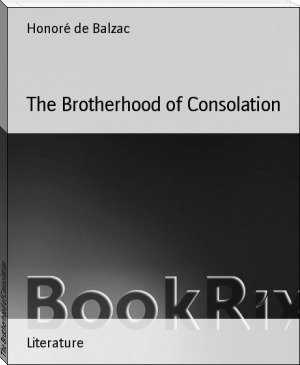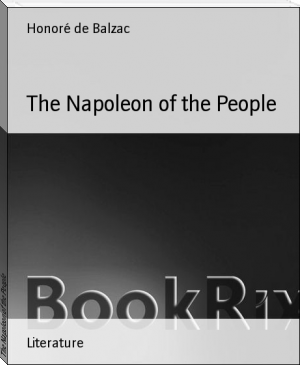The Brotherhood of Consolation by Honoré de Balzac (ereader manga txt) 📖

- Author: Honoré de Balzac
Book online «The Brotherhood of Consolation by Honoré de Balzac (ereader manga txt) 📖». Author Honoré de Balzac
"This explains to me your relations with the house of Mongenod," said Godefroid,--"and your fortune."
Again the goodman looked at Godefroid with a smile, and the same expression of kindly mischief.
"Oh, go on!" said Godefroid, seeing from his manner that he had more to tell.
"This conclusion, my dear Godefroid, made the deepest impression on me. If the man who had suffered so much, if my friend forgave my injustice, I could not forgive myself."
"Oh!" ejaculated Godefroid.
"I resolved to devote all my superfluous means--about ten thousand francs a year--to acts of intelligent benevolence," continued Monsieur Alain, tranquilly. "About this time it was that I made the acquaintance of a judge of the Lower Civil Court of the Seine named Popinot, whom we had the great grief of losing three years ago, and who practised for fifteen years an active and most intelligent charity in the quartier Saint-Marcel. It was he, with the venerable vicar of Notre-Dame and Madame, who first thought of founding the work in which we are now co-operating, and which, since 1825, has quietly done much good. This work has found its soul in Madame de la Chanterie, for she is truly the inspiration of this enterprise. The vicar has known how to make us more religious than we were at first, by showing us the necessity of being virtuous ourselves in order to inspire virtue; in short, to preach by example. The farther we have advanced in our work, the happier we have mutually found ourselves. And so, you see, it really was the repentance I felt for misconceiving the heart of my friend which gave me the idea of devoting to the poor, through my own hands, the fortune he returned to me, and which I accepted without objecting to the immensity of the sum returned in proportion to the sum lent. Its destination justified my taking it."
This narration, made quietly, without assumption, but with a gentle kindliness in accent, look, and gesture, would have inspired Godefroid to enter this noble and sacred association if his resolution had not already been taken.
"You know the world very little," he said, "if you have such scruples about a matter that would not weigh on any other man's conscience."
"I know only the unfortunate," said Monsieur Alain. "I do not desire to know a world in which men are so little afraid of judging one another. But see! it is almost midnight, and I still have my chapter of the 'Imitation of Jesus Christ' to meditate upon! Good-night!"
Godefroid took the old man's hand and pressed it, with an expression of admiration.
"Can you tell me Madame de la Chanterie's history?"
"Impossible, without her consent," replied Monsieur Alain; "for it is connected with one of the most terrible events of Imperial policy. It was through my friend Bordin that I first knew Madame. He had in his possession all the secrets of that noble life; it was he who, if I may say so, led me to this house."
"I thank you," said Godefroid, "for having told me your life; there are many lessons in it for me."
"Do you know what is the moral of it?"
"Tell me," said Godefroid, "for perhaps I may see something different in it from what you see."
"Well, it is this: that pleasure is an accident in a Christian's life; it is not the aim of it; and this we learn too late."
"What happens when we turn to Christianity?" asked Godefroid.
"See!" said the goodman.
He pointed with his finger to some letters of gold on a black ground which the new lodger had not observed, for this was the first time he had ever been in Monsieur Alain's room. Godefroid turned and read the words: TRANSIRE BENEFACIENDO.
"That is our motto. If you become one of us, that will be your only commission. We read that commission, which we have given to ourselves, at all times, in the morning when we rise, in the evening when we lie down, and when we are dressing. Ah! if you did but know what immense pleasures there are in accomplishing that motto!"
"Such as--?" said Godefroid, hoping for further revelations.
"I must tell you that we are as rich as Baron de Nucingen himself. But the 'Imitation of Jesus Christ' forbids us to regard our wealth as our own. We are only the spenders of it; and if we had any pride in being that, we should not be worthy of dispensing it. It would not be _transire benefaciendo_; it would be inward enjoyment. For if you say to yourself with a swelling of the nostrils, 'I play the part of Providence!' (as you might have thought if you had been in my place this morning and saved the future lives of a whole family), you would become a Sardanapalus,--an evil one! None of these gentlemen living here thinks of himself when he does good. All vanity, all pride, all self-love, must be stripped off, and that is hard to do,--yes, very hard."
Godefroid bade him good-night, and returned to his own room, deeply affected by this narrative. But his curiosity was more whetted than satisfied, for the central figure of the picture was Madame de la Chanterie. The history of the life of that woman became of the utmost importance to him, so that he made the obtaining of it the object of his stay in that house. He already perceived in this association of five persons a vast enterprise of Charity; but he thought far less of that than he did of its heroine.
VIII. WHO SHE WAS--WIFE AND MOTHER
The would-be disciple passed many days in observing more carefully than he had hitherto done the rare persons among whom fate had brought him; and he became the subject of a moral phenomenon which modern philosophers have despised,--possibly out of ignorance.
The sphere in which he lived had a positive action upon Godefroid. The laws which regulate the physical nature under relation to the atmospheric environment in which it is developed, rule also in the moral nature. Hence it follows that the assembling together of condemned prisoners is one of the greatest of social crimes; and also that their isolation is an experiment of doubtful success. Condemned criminals ought to be in religious institutions, surrounded by prodigies of Good, instead of being cast as they are into sight and knowledge of Evil only. The Church can be expected to show an absolute devotion in this matter. If it sends missionaries to heathen or savage nations, with how much greater joy would it welcome the mission of redeeming the heathen of civilization? for all criminals are atheists, and often without knowing they are so.
Godefroid found these five associated persons endowed with the qualities they required in him. They were all without pride, without vanity, truly humble and pious; also without any of the pretension which constitutes _devotion_, using that word in its worst sense. These virtues were contagious; he was filled with a desire to imitate these hidden heroes, and he ended by passionately studying the book he had begun by despising. Within two weeks he reduced his views of life to its simplest lines,--to what it really _is_ when we consider it from the higher point of view to which the Divine spirit leads us. His curiosity--worldly at first, and excited by many vulgar and material motives--purified itself; if he did not renounce it altogether, the fault was not his; any one would have found it difficult to resign an interest in Madame de la Chanterie; but Godefroid showed, without intending it, a discretion which was appreciated by these persons, in whom the divine Spirit had developed a marvellous power of the faculties,--as, indeed, it often does among recluses. The concentration of the moral forces, no matter under what system it may be effected, increases the compass of them tenfold.
"Our friend is not yet converted," said the good Abbe de Veze, "but he is seeking to be."
An unforeseen circumstance brought about the revelation of Madame de la Chanterie's history to Godefroid; and so fully was this made to him that the overpowering interest she excited in his soul was completely satisfied.
The public mind was at that time much occupied by one of those horrible criminal trials which mark the annals of our police-courts. This trial had gathered its chief interest from the character of the criminals themselves, whose audacity, superior intelligence in evil, and cynical replies, had horrified the community. It is a matter worthy of remark that no newspaper ever found its way into the hotel de la Chanterie, and Godefroid only heard of the rejection of the criminals' appeal from his master in book-keeping; for the trial itself had taken place some time before he came to live in his new abode.
"Do you ever encounter," he said to his new friends, "such atrocious villains as those men? and if you do encounter them, how do you manage them?"
"In the first place," said Monsieur Nicolas, "there are no atrocious villains. There are diseased natures, to be cared for in asylums; but outside of those rare medical cases, we find only persons who are without religion, or who reason ill; and the mission of charity is to teach them the right use of reason, to encourage the weak, and guide aright those who go astray."
"And," said the Abbe de Veze, "all is possible to such teachers, for God is with them."
"If they were to send you those criminals, you could do nothing with them, could you?" asked Godefroid.
"The time would be too short," remarked Monsieur Alain.
"In general," said Monsieur Nicolas, "persons turn over to religion souls which have reached the last stages of evil, and leave it no time to do its work. The criminals of whom you speak were men of remarkable vigor; could they have been within our hands in time they might have become distinguished men; but as soon as they committed a murder, it was no longer possible to interfere; they then belonged to human justice."
"That must mean," said Godefroid, "that you are against the penalty of death?"
Monsieur Nicolas rose hastily and left the room.
"Do not ever mention the penalty of death again before Monsieur Nicolas," said Monsieur Alain. "He recognized in a criminal at whose execution he was officially present his natural son."
"And the son was innocent!" added Monsieur Joseph.
Madame de la Chanterie, who had been absent for a while, returned to the salon at this moment.
"But you must admit," said Godefroid, addressing Monsieur Joseph, "that society cannot exist without the death penalty, and that those persons who to-morrow morning will have their heads cut--"
Godefroid felt his mouth suddenly closed by a vigorous hand, and he saw the abbe leading away Madame de la Chanterie in an almost fainting condition.
"What have you done?" Monsieur Joseph said to him. "Take him away, Alain!" he added, removing the hand with which he had gagged Godefroid. Then he followed the Abbe de Veze into Madame de la Chanterie's room.
"Come!" said Monsieur Alain to Godefroid; "you have made it essential that I should tell you the secrets of Madame's life."
They were presently sitting in the old man's room.
"Well?" said Godefroid, whose face showed plainly his regret for having been the cause of something which, in that peaceful home, might be called a catastrophe.
"I am waiting till Manon comes to reassure us," replied the goodman, listening to the steps of
 Have you ever thought about what fiction is? Probably, such a question may seem surprising: and so everything is clear. Every person throughout his life has to repeatedly create the works he needs for specific purposes - statements, autobiographies, dictations - using not gypsum or clay, not musical notes, not paints, but just a word. At the same time, almost every person will be very surprised if he is told that he thereby created a work of fiction, which is very different from visual art, music and sculpture making. However, everyone understands that a student's essay or dictation is fundamentally different from novels, short stories, news that are created by professional writers. In the works of professionals there is the most important difference - excogitation. But, oddly enough, in a school literature course, you don’t realize the full power of fiction. So using our website in your free time discover fiction for yourself.
Have you ever thought about what fiction is? Probably, such a question may seem surprising: and so everything is clear. Every person throughout his life has to repeatedly create the works he needs for specific purposes - statements, autobiographies, dictations - using not gypsum or clay, not musical notes, not paints, but just a word. At the same time, almost every person will be very surprised if he is told that he thereby created a work of fiction, which is very different from visual art, music and sculpture making. However, everyone understands that a student's essay or dictation is fundamentally different from novels, short stories, news that are created by professional writers. In the works of professionals there is the most important difference - excogitation. But, oddly enough, in a school literature course, you don’t realize the full power of fiction. So using our website in your free time discover fiction for yourself. 




Comments (0)